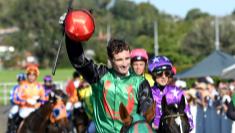
Neville Atkins remembered for his many qualities
A rustic exterior hid a good heart and a level of horsemanship that made Neville Atkins both an achiever and a character of New Zealand training ranks in the final three decades of the 20th Century.
Memories of Atkins and his wide range of achievements have been revived this week following his death after a long illness in Queensland last Sunday aged 83.
Amongst those to pay tribute to Atkins is Nigel Tiley, who with his wife Lee spends his winter in the Queensland seaside resort of Hervey Bay, where Atkins lived the final years of his life with wife Dee.
Tiley’s relationship with Atkins dates back to the mid-1970s when he was an apprentice jockey indentured to Takanini trainer Alf Cole.
“I was just kicking off and Wally Hooton, the Auckland apprentice school riding master, put my name forward to ride Neville’s horse Persian King in an invitation apprentices’ race at Ellerslie,” Tiley recalled.
“I had ridden only three winners but Nev agreed to put me on and we won the race. That was the start of a very successful trainer-jockey relationship, but just as importantly also the start of a wonderful friendship.
“Lee and I have been wintering over in Hervey Bay for the last six years and it’s been great being able to catch up with Nev.
“His health hadn’t been the best the past couple of years and we visited him last Friday when we said our goodbyes. His funeral service took place today (Thursday) and I was privileged to be able to talk about our times together and what made him the man he was.
“Nev was a horseman first and foremost, but he could do anything – shoe them, do their teeth – you name it, there wasn’t much he couldn’t do.”
The horse that will always be associated with Atkins and Tiley is Ring The Bell, the champion staying three-year-old of the 1980-81 season.
After showing promise as a two-year-old, Ring The Bell blossomed at three once he was stepped up to longer distances. He won the Alison Stakes, Avondale Guineas and New Zealand Derby, then took that form to Sydney for wins in the Canterbury Guineas and Tulloch Stakes and second place in the AJC Derby.
On his return to Atkins’ Waiuku stable, just nine days after finishing second to Our Paddy Boy in the 2400m AJC Derby, Ring The Bell lined up – and won – the 2000m Avondale Championship Stakes.
Those achievements inspired owners Hilton Mackley and Geoffrey Wild to make plans to campaign Ring The Bell in Europe, placing him officially in the name of Newmarket trainer Henry Cecil but still involving Atkins and Tiley.
The ultimate target was the Prix de l’Arc de Triomphe, which he contested unsuccessfully at Longchamp in October 1981, and while Ring The Bell was placed in quality staying races, challenges in acclimatising undermined the venture.
That was a far cry from Atkins’ initial training days, having graduated from whip with the Pakuranga Hunt to setting up his own stable at Waiuku, close by Karioitahi Beach on the west coast south of Manukau Harbour.
He initially made his name with jumpers, winning major races at Ellerslie with the likes of Tassaby, Little Rebel, Regenerate and Le Roy, and placing twice in the Great Northern Steeplechase with Patrone.
While not of Vincent O’Brien proportions, Atkins’ transition from jumps racing success to flat racing was still significant. His first Group One winner was Kaiser in the 1978 New Zealand Derby, a victory repeated two years later with Ring The Bell, while the tough stayer Secured Deposit put together an impressive record.
After finishing second in the 1982 New Zealand Derby and the following month’s Wellington Derby, the big son of Kirrama won the New Zealand St Leger and at the end of his three-year-old campaign finished second in the Sydney Cup.
As a four-year-old Secured Deposit won the Wellington Cup, and then as a fully mature five-year-old he won the Auckland Cup, finished second in the Wellington Cup and third in the Sydney Cup.
Fellow Waiuku trainer Moira Murdoch was well familiar with the Atkins training methods, having worked for him as a teenager before establishing her own stable based around beach training at Karioitahi and preparing a string of major winners headed by 1994 Cox Plate winner Solvit.
“We still use the same systems that Neville put in place at the beach all those years ago,” Murdoch said. “Those jumpers of his, they never did huge mileage, but man, could he get them fit!
“We had a wonderful association and one thing I could say categorically about Nedville was that if you needed any help, he would be there for you. He was a good guy.”
That theme also comes through when discussing Atkins with one of his closest associates, former long-time stable employee Maurie Campbell.
“We became mates years ago and had some great times and a whole lot of fun,” Campbell said. “We could have written a book between the two of us, and it would have been a beauty.
“He was a very good trainer, an expert at conditioning a horse and a hard worker, but the thing that stood out for me with Nev was his loyalty.
“I remember when we were stuck for a rider for Persian King in that apprentice race at Ellerslie and Wally Hooton recommended Nigel (Tiley). He was pretty much unknown at the time and the owners weren’t keen, to the point they were going to scratch rather than put him on.
“Nev wouldn’t budge though, he said if you scratch him, you can take your horse somewhere else. Well of course they didn’t, and Persian King won the race.
“You don’t see many people like Nev anymore, he was just a good guy, he knew how to enjoy the wins and the losses, and he knew what he was doing.”








